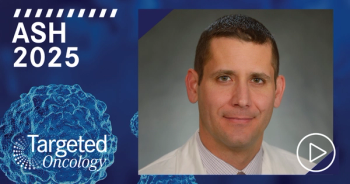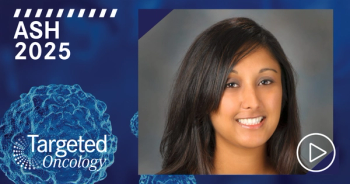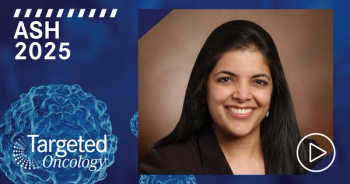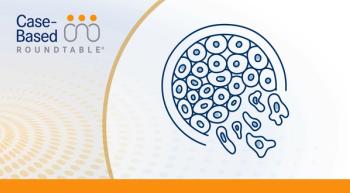
Targeted Therapies in Oncology
- February 2, 2022
- Volume 11
- Issue 3
- Pages: 22
Seeking Clarity for Treatment Sequencing With CAR T in Follicular Lymphoma
Considering later lines of treatment such as chimeric antigen receptor T-cell therapy, make it difficult for chimeric antigen receptor T-cell therapy to find its optimal place in the armamentarium.
Numerous therapeutic options are available for the treatment of
Follicular lymphoma is different from diffuse large B-cell lymphoma [DLBCL]...in that most of these patients have an indolent disease, and a relapse in follicular lymphoma does not mean you have to treat the patient right away,” Jose Sandoval-Sus, MD, assistant member of the Moffitt Malignant Hematology and Cellular Therapy at Memorial Healthcare System at Moffitt Cancer Center in Pembroke Pines, Florida, said in an interview with Targeted Therapies in OncologyTM. “The patient can relapse and be without a second line of therapy for months or even years.” As such, the timing and order of treatments for FL may vary from that of other lymphomas.
Current Therapies
Although the combination of rituximab (Rituxan) and chemotherapy have improved survival outlook for patients with FL, the need to identify effective later lines of therapy and unique combinations remains. For example, the combination of bendamustine HCl (Bendeka) with rituximab has resulted in improved median progression-free survival (PFS) and associated toxicities compared with rituximab, cyclophosphamide, doxorubicin, vincristine, and prednisone (R-CHOP) and rituximab, cyclophosphamide, vincristine, and prednisone (R-CHP), leading to a preference for the doublet as first-line therapy.1,2 Another available anti-CD20 monoclonal antibody is obinutuzumab (Gazyva), which has a similar response rate and overall safety profile to rituximab, but its higher toxicity profile is a concern when used with CHOP or bendamustine, so it is recommended in the sec- ond-line setting at this time.3
Other combinations including immunomodu- lators such as lenalidomide (Revlimid) and PI3K inhibitors such as idelalisib (Zydelig), duvelisib (Copiktra), copanlisib (Aliqopa), and umbralisib (Ukoniq) are available for patients with relapsed or refractory (R/R) FL. Currently, the only CAR T-cell therapy with FDA approval in R/R FL as a whole is axicabtagene ciloleucel (axi-cel; Yescarta).4 Lisocabtagene maraleucel (liso-cel; Breyanzi) is approved for grade 3b R/R FL specifically.5 Tisagenlecleucel (tisa-cel; Kymriah) is another prominent CAR T-cell therapy that has been granted priority review in R/R FL and is approved for use in R/R B-cell lymphoma and diffuse large B-cell lymphoma (DLBCL).6,7
Drug Interactions
Bendamustine
There is concern that the early use of bendamus- tine may present obstacles to the later use of CAR T. In particular, bendamustine's lymphodepleting properties could affect the timing required to manufacture CAR T cells. Marked reductions in CD3+ and CD3+CD4+ T cells were observed during induction with bendamustine in combination with obinutuzumab and rituximab in the GALLIUM study (NCT01332968).3 Two other studies evalu- ating bendamustine-rituximab found a greater sustained and pronounced depletion in CD4+ and CD8+ T cells compared with R-CHOP.8,9
“The concern is that using bendamustine-based regimens could limit the quality and quantity of CAR T cells [when manufacturing the therapy],” Sandoval-Sus said.
The choice of lymphodepleting agent was explored in the phase 2 JULIET trial (NCT02445248). In the trial, investigators chose cyclophosphamide/ fludarabine or bendamustine as lymphodepleting agents prior to tisa-cel administration.10 A total of 103 patients (93%) received the lymphodepleting chemotherapy, with 73% receiving the combination of cyclophosphamide/fludarabine. A total of 24 patients (20%) received bendamustine, and the 3-month PFS estimate was 52% (95% CI, 30%- 70%), with a suggested improvement seen in the rate of cytopenias.
Studies in R/R Hodgkin lymphoma sug- gest that bendamustine with fludarabine is a preferred lymphodepletion modality prior to initiation of CAR T-cell treatment.11 More data are needed to determine the exact impact bendamus- tine has on CAR T cells.
PI3K Inhibitors
The relationship between PI3K inhibitors and CAR T cells appears positive.12 Recent data suggest the expansion of T cells is significantly increased when PI3K inhibitors are added to CAR T-cell therapy.
For example, in a phase 1 escalation and expansion trial (NCT03274219) presented during the 2020 American Society of Hematology (ASH) Annual Meeting, investigators enriched the CAR product bb21217 with the addition of the PI3K inhibitor bb007. Investigators observed an improved response and extend- ed duration of response (DOR) compared with non-enriched CAR T cells in patients.13
In a preclinical study, T cells were success- fully expanded from patients with heavily pretreated lymphoma, resulting in increased frequencies of CD8 cells and costimulatory mol- ecule–expressing cells. This ultimately led to greater in vivo expansion and antitumor activity.14 Another in vivo study determined that PI3K inhibition ultimately enhanced the durability of CAR T cells, improving in vivo persistence and reducing tumor burden.15
Approval for PI3K inhibitors in FL is cur- rently based on phase 2 trial data, making selection difficult.
"Umbralisib is perhaps my treatment of choice right now,” Sandoval-Sus said. “Although we should never compare between trials, the [adverse] effects appear a little more generous. The overall response, complete response, and PFS rates are all similar.”
CAR T-Cell Toxicities
There is certainly an understandable con- cern for toxicities given that the boxed warning on all approved CAR T-cell therapies includes risks for cytokine release syndrome (CRS) and neurologic toxicity. Initially, the grading of CRS and toxicity management was not standardized, making it difficult to compare safety profiles of different CAR T-cell therapies.16 The American Society for Transplantation and Cellular Therapy released consensus guidelines in 2019 to further simplify CRS grading.17,18 Neurotoxicity can occur with CRS or inde- pendent of CRS. Neurotoxicity resulting in fatal cerebral edema has been reported, and all were associated with concomitant CRS.16
Several cancer organizations have since released consensus guidelines on the management of toxicities related to CAR T-cell therapy use, including the American Society of Clinical Oncology and the Society for Immunotherapy of Cancer.19,20
Preemptive use of anti–IL-6 agents such as tocilizumab (Actemra) and corticosteroids are an often-used approach.16 Additionally, the safety profile of later-generation CAR T-cell therapies have improved, with lower rates of grade 3 or higher CRS and neurotoxicity reported in the ELARA (NCT03568461) and ZUMA-5 (NCT03105336) trials.21,22
Axi-cel
Axi-cel was granted accelerated approval by the FDA for treatment of adult patients with R/R FL after 2 or more prior lines of systemic therapy based on results from the phase 2 ZUMA-5 trial.4 Specifically in patients with FL, the trial showed an overall response rate of 94% (95% CI, 87%-98%) by independent central review with axi-cel. Seventy-six percent of patients had a complete response.22 Neither the median progression-free survival, overall survival, nor the median DOR were reached at the time of data cutoff in the cohort.23
Grade 3 or higher CRS was reported in 6% of patients with FL and grade 3 or higher neurologic toxicity in 15%.22,23
Tisa-cel
Primary analysis from the phase 2 ELARA trial indicates tisa-cel resulted in an overall response rate of 86% (95% CI, 78%-92%) and a complete response rate of 66% (95% CI, 56%- 75%) with 1-time infusion in patients with R/R FL. Most patients were heavily pretreated, and no patients in the trial experienced a 3 or higher grade of CRS (FIGURE).21
This trial included patients who had R/R FL after receiving 2 or more lines of therapy or after failing autologous stem cell transplantation with a median of 4 prior lines of therapy (range, 2-13). Neutropenia (28%) and anemia (13%) were the most common grade 3 or higher adverse events among the 97 patients evaluable for safety. CRS of any grade was observed in 49% of patients (grade ≥3, 0%), and 9% of patients experienced any-grade neurological events (grade 3, 0%; grade 4, 1 patient who recovered). These data show the promise of tisa-cel in patients with R/R FL, but further meta-analysis and trials are needed to determine proper patient selection.21
Sandoval-Sus noted that “the ELARA study was fairly similar to the ZUMA-5 study, which led to axi-cel’s approval. Though there were some differences in the study populations, there were similar numbers of patients with progression of disease within 24 months (POD24), which is a very established high-risk follicular lymphoma population.”
Liso-cel
The FDA approved liso-cel for treatment of adult patients with R/R large B-cell lymphoma (LBCL) after 2 or more lines of systemic therapy, including DLBCL not otherwise specified, high-grade B-cell lymphoma, primary mediastinal LBCL, and FL grade 3b. Approval was based on the ongoing TRANSCEND-NHL-001 trial (NCT02631044).24
A total of 344 adult patients with R/R LBCL of various histological subgroups, including FL, were included, and 269 of them received at least 1 dose of liso-cel; 256 patients were evaluable for efficacy. Patients had a median of 3 prior lines of therapy (range, 1-8), with 97% having had at least 2 previous lines of therapy. The objective response rate was 73% (95% CI, 66.8%-78.0%), and the complete response rate was 53% (95% CI, 46.8%-59.4%). The most common grade 3 or higher adverse events included neutropenia (60%), anemia (37%), and thrombocytopenia (27%). CRS was observed in 42% of patients (grade 3, 2%), with neurological events observed in 30% (grade 3, 10%).24
Another ongoing phase 2 trial, TRANSCENDWORLD (NCT03484702) is evalu- ating the efficacy and safety of liso-cel in adults with aggressive B-cell non-Hodgkin lymphoma (NHL), including grade 3b FL.25 More data are needed to determine the true impact on FL as a whole.
Other Emerging Therapeutic Options
Bispecific Antibodies
The development and promising rates of durable remission associated with CAR T cells, along with the potential for bispecific antibody use in CAR T-cell failure, has turned the spotlight back toward this technology as a possible therapy.26
Glofitamab
Glofitamab is a novel, T-cell–engaging bispecific antibody that has a longer half-life compared with non–Fc-bearing bispecific T-cell engagers and targets CD20. The configuration enables bivalent binding to CD20 on B cells and monovalent binding to CD3 on T cells.27
Updated analysis from a phase 1/2 study evaluating patients with multiple R/R FL treated with glofitamab as monotherapy or in combination with obinutuzumab was presented by Franck Morschhauser, MD, PhD, professor of hematology and head of the Lymphoma Unit, Centre Hospitalier Universitaire de Lille, in France, during ASH 2021. The complete metabolic response (CMR) rate ranged from 7% to 33% for the 3 monotherapy cohorts and was 74% for the combination cohort. Median follow-up of CMR ranged from 0–14 months (monotherapy) and 0–5 months (combination). An 81% overall response rate was observed in the 53 patients receiving monotherapy, and a 100% overall response rate was observed in the combination arm. At a median follow-up of 4.4 months (95% CI, 3.5-8.6), the CMR rate was 70% in the monotherapy arm, and it was 74% at a median follow-up of 5.5 months (95% CI, 5.4-6.3) in the combination arm.28,29
Mosunetuzumab
Mosunetuzumab is another bispecific anti-body of interest in the treatment of R/R FL. The agent targets CD20 (B cells) and CD3 (T cells), redirecting T cells to engage and eliminate malignant B cells. It is currently being evaluated in a phase 1/2 study (NCT02500407). Results from the phase 1 dose-escalation portion revealed high activity and a favorable safety profile for mosunetuzumab in patients with R/R FL who had received 2 or more previous lines of therapy.30
Updated results from the phase 2 expansion cohort were presented at ASH 2021 by Elizabeth Budde, MD, PhD, City of Hope Comprehensive Cancer Center in Duarte, California. A total of 90 patients with R/R FL who had received 2 or more prior lines of therapy were included. Results included a complete response (CR) rate of 60% (95% CI, 49%-70%) and an objective response rate of 80% (95% CI, 70%-88%) per independent review facility. Median duration of response was 22.8 months (95% CI, 9.7-not evaluable), and median PFS was 17.9 months (10.1-not evaluable). The CR rate for patients with POD24 disease was 57% (95% CI, 42%-72%) versus 63% (95% CI, 47%- 77%) for those without. CRS was observed in 44.4% of patients but was mostly grade 1 (25.6%) or grade 2 (16.7%), with 1 patient each experiencing grade 3 and grade 4 CRS. All CRS events resolved.31,32
Sandoval-Sus sees great potential with bispecific antibodies in FL. “In my opinion, bispecific antibodies will be one of the major competitors of CAR T cells, specifically in follicular lymphoma, but we certainly need more information and need to learn how to properly use them.”
Looking Forward
Although FL remains a disease that is rarely curable, Sandoval-Sus is encouraged about future potential treatments for patients with FL.
“I am looking forward to the outcome of tisa-cel and the likely FDA approval. I am also very eager to see the follow-up results of the bispecific antibodies. If we have medications [that] can be given safely and with excellent responses, it will be interesting to see what happens in the future with both therapies,” he said.
He added that he is also interested in future trials involving CAR T-cell therapy in combination with PI3K and EZH2 inhibitors in the hope that combinations may provide improved quality of response and decreased toxicities.
REFERENCE:
1. Rummel MJ, Niederle N, Maschmeyer G, et al; Study group indolent Lymphomas (StiL). Bendamustine plus rituximab versus CHOP plus rituximab as first-line treatment for patients with indolent and mantle-cell lymphomas: an open-label, multicentre, randomised, phase 3 non-inferiority trial. Lancet. 2013;381(9873):1203-1210. doi:10.1016/s0140-6736(12)61763-2
2. Mondello P, Steiner N, Willenbacher W, et al. Bendamustine plus rituximab versus R-CHOP as first-line treatment for patients with follicular lymphoma grade 3a: evidence from a multicenter, retrospective study. Oncologist. 2018;23(4):454-460. doi:10.1634/theoncologist.2017-0037
3. Hiddemann W, Barbui AM, Canales MA, et al. Immunochemotherapy with obinutuzumab or rituximab for previously untreated follicular lymphoma in the GALLIUM study: influence of chemotherapy on efficacy and safety. J Clin Oncol. 2018;36(23):2395-2404. doi:10.1200/jco.2017.76.8960
4. FDA grants accelerated approval to axicabtagene ciloleucel for relapsed or refractory follicular lymphoma. FDA. Updated March 08, 2021. Accessed November 17, 2021, 2021. https://bit.ly/33YChva
5. FDA approves lisocabtagene maraleucel for relapsed or refractory large B-cell lymphoma. FDA Updated February 5, 2021. Accessed January 27, 2021, 2022. https://bit.ly/3rSLOvy
6. FDA approves tisagenlecleucel for adults with relapsed or refractory large B-cell lymphoma. FDA. Updated May 03, 2018. Accessed January 27, 2022, 2022. https://bit.ly/3AI0PUY
7. Novartis receives priority review by US FDA and filing acceptance by EMA for Kymriah to treat patients with relapsed or refractory follicular lymphoma. News release. Novartis. October 27, 2021. Accessed January 30, 2022. https://bit.ly/3rWqBBe
8. García Muñoz R, Izquierdo-Gil A, Muñoz A, Roldan-Galiacho V, Rabasa P, Panizo C. Lymphocyte recovery is impaired in patients with chronic lymphocytic leukemia and indolent non-Hodgkin lymphomas treated with bendamustine plus rituximab. Ann Hematol. 2014;93(11):1879-1887. doi:10.1007/s00277-014-2135-8
9. Yutaka T, Ito S, Ohigashi H, et al. Sustained CD4 and CD8 lymphopenia after rituximab maintenance therapy following bendamustine and rituximab combination therapy for lymphoma. Leuk Lymphoma. 2015;56(11):3216-3218. doi:10.3109/10428194.2015.1026818
10. Svoboda J, Ballard HJ, Chong EA, et al. Use of bendamustine for lymphodepletion before tisagenlecleucel (anti-CD19 CAR T cells) for aggressive B-cell lymphomas. Blood. 2019;134(suppl 1):1606. doi:10.1182/blood-2019-131482
11. Ramos CA, Grover NS, Beaven AW, et al. Anti-CD30 CAR-T cell therapy in relapsed and refractory Hodgkin lymphoma. J Clin Oncol. 2020;38(32):3794-3804. doi:10.1200/jco.20.01342
12. Chandrasekaran S, Funk CR, Kleber T, Paulos CM, Shanmugam M, Waller EK. Strategies to overcome failures in T-cell immunotherapies by targeting PI3K-δ and -γ. Front Immunol. 2021;12:718621. doi:10.3389/fimmu.2021.718621
13. Alsina M, Shah N, Raje NS, et al. Updated results from the phase I CRB-402 study of anti-BCMA CAR-T cell therapy bb21217 in patients with relapsed and refractory multiple myeloma: correlation of expansion and duration of response with T cell phenotypes. Presented at: 2020 ASH Annual Meeting; December 5-8, 2020; Virtual. Abstract 130.
14. Funk CR, Wang S, Chen KZ, et al. PI3Kδ/γ inhibition promotes human CART cell epigenetic and metabolic reprogramming to enhance antitumor cytotoxicity. Blood. 2022;139(4):523-537. doi:10.1182/blood.2021011597
15. Zheng W, O'Hear CE, Alli R, et al. PI3K orchestration of the in vivo persistence of chimeric antigen receptor-modified T cells. Leukemia. 2018;32(5):1157-1167. doi:10.1038/s41375-017-0008-6
16. Freyer CW, Porter DL. Cytokine release syndrome and neurotoxicity following CAR T-cell therapy for hematologic malignancies. J Allergy Clin Immunol. 2020;146(5):940-948. doi:10.1016/j.jaci.2020.07.025
17. Shah BD, Bishop MR, Oluwole OO, et al. KTE-X19 anti-CD19 CAR T-cell therapy in adult relapsed/refractory acute lymphoblastic leukemia: ZUMA-3 phase 1 results. Blood. 2021;138(1):11-22. doi:10.1182/blood.2020009098
18. Lee DW, Santomasso BD, Locke FL, et al. ASTCT consensus grading for cytokine release syndrome and neurologic toxicity associated with immune effector cells. Biol Blood Marrow Transplant. 2019;25(4):625-638. doi:10.1016/j.bbmt.2018.12.758
19. Maus MV, Alexander S, Bishop MR, et al. Society for Immunotherapy of Cancer (SITC) clinical practice guideline on immune effector cell-related adverse events. J Immunother Cancer. 2020;8(2):e001511. doi:10.1136/jitc-2020-001511
20. Santomasso BD, Nastoupil LJ, Adkins S, et al. Management of immune-related adverse events in patients treated with chimeric antigen receptor T-cell therapy: ASCO guideline. J Clin Oncol. 2021;39(35):3978-3992. doi:10.1200/JCO.21.01992
21. Schuster SJ, Dickinson MJ, Dreyling MH, et al. Efficacy and safety of tisagenlecleucel (tisa-cel) in adult patients (Pts) with relapsed/refractory follicular lymphoma (r/r FL): primary analysis of the phase 2 Elara trial. J Clin Oncol. 2021;39(suppl 15):7508. doi:10.1200/JCO.2021.39.15_suppl.7508
22. Jacobson CA, Chavez JC, Sehgal AR, et al. Axicabtagene ciloleucel in relapsed or refractory indolent non-Hodgkin lymphoma (ZUMA-5): a single-arm, multicentre, phase 2 trial. Lancet Oncol. 2022;23(1):91-103. doi:10.1016/s1470-2045(21)00591-x
23. Jacobson CA, Chavez JC, Sehgal AR, et al. Axicabtagene ciloleucel in relapsed or refractory indolent non-Hodgkin lymphoma (ZUMA-5): a single-arm, multicentre, phase 2 trial. Lancet Oncol. 2022;23(1):91-103. doi:10.1016/S1470-2045(21)00591-X
24. Abramson JS, Palomba ML, Gordon LI, et al. Lisocabtagene maraleucel for patients with relapsed or refractory large B-cell lymphomas (TRANSCEND NHL 001): a multicentre seamless design study. Lancet. 2020;396(10254):839-852. doi:10.1016/S0140-6736(20)31366-0
25. Bristol Myers Squibb receives positive CHMP opinion for CAR T cell therapy Breyanzi (lisocabtagene maraleucel) for relapsed or refractory DLBCL, PMBCL and FL3B. News release. Bristol Myers Squibb. January 28, 2022. https://bit.ly/3o7aVde
26. Depil S, Duchateau P, Grupp SA, Mufti G, Poirot L. 'Off-the-shelf' allogeneic CAR T cells: development and challenges. Nat Rev Drug Discov. 2020;19(3):185-199. doi:10.1038/s41573-019-0051-2
27. Wallet MA, Nishimura T, Del Casale C, et al. Induced pluripotent stem cell-derived gamma delta CAR-T cells for cancer immunotherapy. Blood. 2021;138(suppl 1):2771. doi:10.1182/blood-2021-149095
28. Schuster SJ. Bispecific antibodies for the treatment of lymphomas: promises and challenges. Hematol Oncol. 2021;39(suppl 1):113-116. doi:10.1002/hon.2858
29. Morschhauser F, Carlo-Stella C, Dickinson M, et al. Glofitamab as monotherapy and in combination with obinutuzumab induces high complete response rates in patients (pts) with multiple relapsed or refractory (R/R) follicular lymphoma (FL). Blood. 2021;138(suppl 1):128. doi:10.1182/blood-2021-148778
30. Assouline SE, Kim WS, Sehn LH, et al. Mosunetuzumab shows promising efficacy in patients with multiply relapsed follicular lymphoma: updated clinical experience from a phase I dose-escalation trial. Blood. 2020;136(suppl 1):42-44. doi:10.1182/blood-2020-135839
31. Budde LE, Sehn LH, Matasar MJ, et al. Mosunetuzumab monotherapy is an effective and well-tolerated treatment option for patients with relapsed/refractory (R/R) follicular lymphoma (FL) who have received ≥2 prior lines of therapy: pivotal results from a phase I/II study. Blood. 2021;138(suppl 1):127. doi:10.1182/blood-2021-145872
32. Rosa K. Mosunetuzumab represents effective option for heavily pretreated relapsed/refractory follicular lymphoma. OncLive®. December 11, 2021. Accessed January 25, 2022. https://bit.ly/34h2K6Q
Articles in this issue
almost 4 years ago
It’s Time for Smarter Electronic Medical Recordsalmost 4 years ago
ESMO Updates Clinical Practice Guidelines for Urothelial Canceralmost 4 years ago
Evolving Biomarkers Span Proteomic, Genomic Fields in Multiple Myelomaalmost 4 years ago
Immunotherapy Shakes Up Cervical Cancer Treatment Paradigmalmost 4 years ago
Triplet Achieves High Disease Control in R/M SCCHN








































